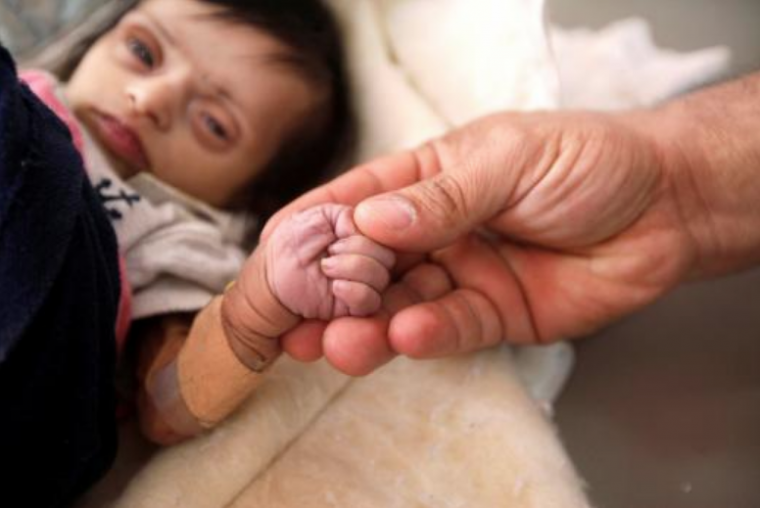Christian Aid slams British 'double standards' over war in Yemen
Christian Aid has accused the UK government of 'double standards' in its engagement on war and peace and demanded that it stop selling arms to Saudi Arabia among other states.
Its new report, Resourcing war and peace: time to address the UK Government's double standards highlights the fact that the UK spends around £37 billion on its military, around three times what it spends on aid.

The report was released as the organisation's poll undertaken by ComRes found that three in five (61 per cent) British adults think the UK government should stop selling military equipment to Saudi Arabia, which is leading a bombing campaign in Yemen.
Christian Aid supporters are sending Christmas cards to the foreign secretary, Jeremy Hunt, echoing the demand that the UK immediately ceases to sell arms to the Saudi-led coalition. The charity says the UK's policy 'increasingly casts a shadow on the UK Government's attempts to profile itself as a values-based international actor committed to tackling global conflict'. Germany, Sweden, Norway, Belgium, Denmark (future exports only) and Finland have all suspended arms sales to Saudi Arabia and the US Senate voted yesterday to end its support for the Yemen war.
The charity insisted to Christian Today that it did not take sides in the conflict, which it described as 'complex', though it said the 'full-blown armed conflict' was sparked by the launch of air strikes by the Saudi-led international coalition.
It said: 'On one side, the UK is leading calls in the UN for a peace agreement, and is the leading financial supporter of humanitarian aid to Yemenis and the UN Special Envoy's peace-making endeavours.
'On the other, it is promoting massive new arms sales to the government of the KSA [Kingdom of Saudi Arabia] and actively supporting military operations of the Saudi-led coalition in Yemen, which have included attacks that may amount to war crimes, such as airstrikes on residential areas, markets, weddings, and even medical facilities.
'In effect, diplomatic efforts to end the conflict, and the humanitarian response to the acute crisis, are completely undermined by the UK's complicity in fuelling the conflict through arms sales. These arms sales are in direct violation of the Arms Trade Treaty and standards such as the EU's consolidated criteria.'
It said: 'The people of Yemen have been crying out for peace, and the peace talks which conclude in Sweden today [Friday] are an important step towards lasting peace. The billions of dollars of immoral arms deals undermine the likelihood of lasting peace, Yemen has been devastated by the use of weapons – and the UK must cease its arms exports to repressive regimes immediately.'
Christian Aid's report praised the UK's commitment to committing 0.7 per cent of its GNI to aid and development. However, it said the UK was also 'on track to be one of the world's biggest arms dealers – fuelling war instead of peace'.
Karol Balfe, who leads on Christian Aid's global peacebuilding programme, said: 'No other arms exporter comes close to this dependence on the Gulf market. In turn, this means that the Royal Saudi Air Force is hugely dependent on British-made aircraft and missiles – maintained and supported in-country by British military and civilian technicians for its own operations.
'The UK Government risks putting its own perceived national security and domestic interests ahead of human security and protection of those living in conflict. In our work, we see that local actors make a huge difference in turning the tide of violence.
'We are heartened to see that the British public is with us on this. With 61 per cent believing these arms sales to Saudi Arabia should stop, we are calling out the UK Government's immoral policy of arms exports to repressive regimes.'
Rowan Williams, Christian Aid's chair and the former Archbishop of Canterbury, said: 'We can't pretend that British involvement in war is a thing of the past. We may not have experienced the direct effects of war in this country for a lifetime, and we can be thankful for that; but our overseas policies are still helping to support violence and injustice elsewhere in the world, among those least able to defend themselves.
'The scale of the humanitarian catastrophe that has overtaken Yemen is one of the most dramatic instances. 14 million people are on the brink of famine, as a result of a war that continues to claim the lives of countless civilians. And this is a war in which the government of the UK is directly complicit: arms sales from this country to Saudi Arabia have increased by two thirds since 2016 and now account for nearly half of Britain's major arms exports.'











